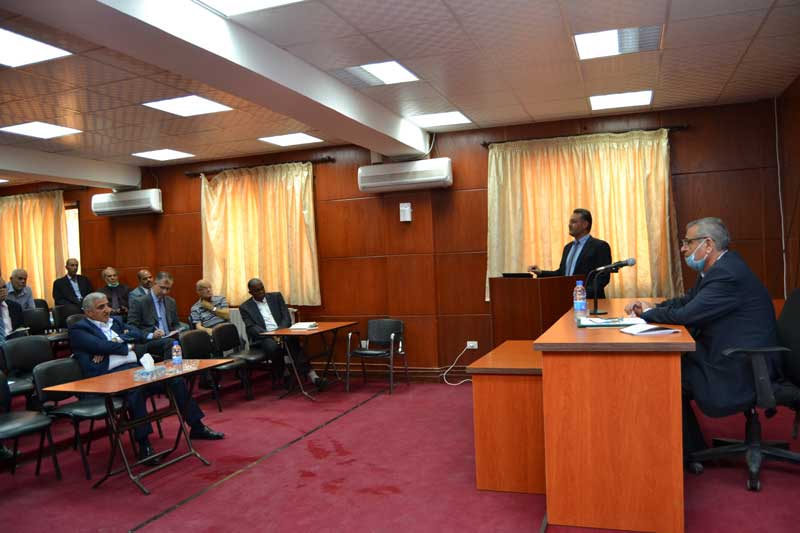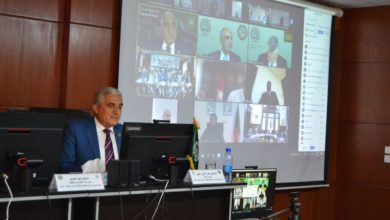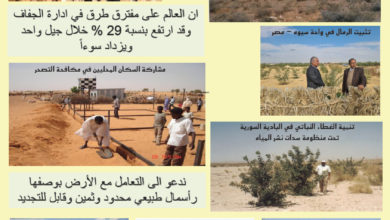The Olive Quick Decline Syndrome // workshop in ACSAD organization.
The Arab Center for the Studies of Arid Zones and Dryland (ACSAD) has recently held a scientific workshop at its headquarters in Damascus on “the inventory and classification of possible types of piercing-sucking insects as vectors for The Olive Quick Decline Syndrome. ” Xylella Fasthidiosa” in olive groves in Lattakia,” in the presence of ACSAD Director-General Dr. Nasr Edin Obaid, and large attendees from interested, researchers, and experts.

The Director-General clarified in a speech at the opening of the workshop; this workshop is held for new research, which is going to be implemented in collaboration among the Arab Center Organization ACSAD, the General Commission for Scientific Agriculture Researches( GCSAR), Tishreen and Damascus Universities, and The Institute for Sustainable Plant Protection in Italy(IPSP-CNR).
Dr. Obeid pointed out that olive cultivation has an important social and heritage significance in the Mediterranean basin countries, as it employs a lot of labor and many local industries depend on it, where most of the areas planted with olive trees are small individual holdings.
He pointed out that the Mediterranean region is considered the first region in olive trees cultivation, where it contains 95% of the total olive trees in the world, and 93% of the European production depends on olive cultivation, where Spain ranks the first position in olive cultivation and production, followed by Italy, Greece, then Syria. Morocco, according to the FAO report, 2019.
The Dean of Damascus University’s Faculty of Agriculture, Dr. Abdul Nabi Bashir, who chaired the session devoted to discussing The Olive Quick Decline Syndrome, noted the importance of this scientific applied research. He appreciated ACSAD valuable role in supporting it and providing all the means to implement it. He pointed out that it is important to ensure that Syria and Arab countries are free of bacteria that cause this disease.
Then Dr. Iyad Mohamed, the plant protection expert, presented a scientific presentation on the mentioned scientific research, noting that olive production suffers from seasonal effects, which have many consequences on the working conditions and availability of secondary products, which depend on olive farming. The olive tree is like other fruit trees. It is infected with many pathogens; the Olive Quick Deline Syndrome caused by the newly spread bacteria Xylella Fasthidiosa in some Mediterranean countries and Europe is one of the most dangerous.
He said: “The epidemiological prevalence of Xylella Fasthidiosa in Italy and several European countries had affected the agricultural areas and environmental system of Europe and the Mediterranean region economically and environmentally.
He pointed out that these bacteria cause diseases of economic importance, such as the grape Pierce’s disease, the almonds’ leaf scorch, yellowing, blotchy mottling on citrus, Oleander Leaf Scorch, and The Olive Quick Decline Syndrome, in addition to its infection with many wild herbs, shrubs, and forest trees where most of them do not show any apparent symptoms (latent infection).
He added the insect transmits bacteria through the piercing-sucking insects, which feed on the sap of the plant, especially the insect of the Hemiptera under the Auchenorrhynch family where the vectors obtain bacteria while feeding on the infected plant then delivering it to another healthy plant where bacteria are placed in the top of the front intestine of the vectors insects. Thus the nymphs lose their ability to transport the bacteria after the (hemimetabolous) molting, and consequently, the resulting insects must feed on infected plants to transport the pathogen.
Dr. Iyad Mohamed, the ACSAD expert, summarized the study’s objectives by limiting, describing, and identifying the most significant kinds of Leafhoppers that feed on the sap that accompany olive groves and adjacent fields; in addition to the herbal plants accompanying it in Lattakia governorate.
Representative samples will be selected from each of the four areas under consideration and will be sent within 70% alcohol to the IPSP-CNR laboratory to extract DNA and then test for The Olive Quick Decline Syndrome through Realtime-PCR.
In conclusion, a vibrant and important discussion took place on the subject, during which Dr. Mohamed answered the attendees’ questions and queries.




